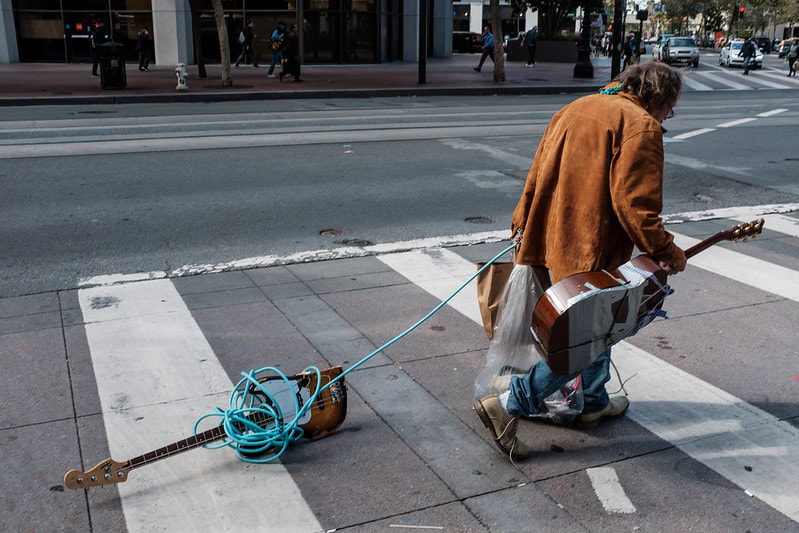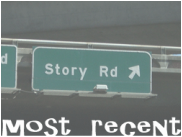| by ANDREW SANGER Untitled by Ken Walton | Flickr In order to begin, please complete a one-time payment of $19.99. Thank you. Songwriting 101 You think you have what it takes to write a hit song? Good news: Everyone does! Even if you lack musical know-how, I’ve designed this course as the perfect intro to achieving your songwriting goals. Perhaps you’re looking for a new hobby, or maybe you want to recapture the heart of the girl who left her laptop charger at your place but refuses to come by to pick it up. Either way, you’re in the right place! Step 1: The Instrument For starters, you’re going to need an instrument to actually write and play with. To this end, you could always go the traditional route of purchasing one. While quality instruments often come with a hefty price tag, the overwhelming dread for your financial future can be utilized later on in the songwriting process (more on this in Step 3). |
| Too poor to afford an instrument? Just borrow one! If you know someone who owns an instrument you want, simply request that they lend it to you for an indefinite period of time. If they refuse, the borrowing process naturally becomes a bit more complex. In those cases, it should go without saying that lightweight and easily concealable instruments are far more conducive to borrowing than some of the larger varieties. Note that you don’t always need to be previously acquainted with the lender. For the purposes of writing my first song I borrowed a guitar from a street performer who looked to be rather slow on his feet (he was). Step 2: The Chord Progression There’s nothing new under the sun, and a plethora of popular (a.k.a. “pop”) music is written using no more than four simple chords. Searching the internet for one these chord progressions will greatly streamline the writing process, which could otherwise take upwards of an hour to craft on your own. Try to pick songs that have some emotional significance for you. For example, if your ex-girlfriend always listened to that one Tom Petty song then that may be a good place to start. Remember: Learning to take the proper shortcuts is an integral part of songwriting. Using the work of others tends to be the easiest (and most fun!) part of the creative process, so feel free to do so as much as you’d like. It’s possible you will come across individuals who will question the artistic merit of this writing strategy. If you run afoul of one of these naysayers, simply refute their arguments using the skills taught in my Debate 101 course ($19.99). For those who haven’t purchased that course, here’s a freebie: In the likelihood your detractor levels claims against you with terms like “intellectual theft” and “plagiarism,” simply make liberal use of the word “intertextuality” in your rebuttal and your opponent will instantly concede to your superior rhetorical ability. Step 3: The Lyrics One thing you cannot get away with being overly-intertextual about is lyrics, so unfortunately you’re going to have to do most of that work yourself. Research indicates that ”personal” lyrics focusing on “painful” subjects are invaluable tools for budding songwriters. For proof, just look at staggering number of successful musicians who arose out of difficult backgrounds and have lyrically exploited their pasts to achieve songwriting success. Sadly, not everyone is fortunate enough to have such a past to draw upon for maximum lyrical effect. If that’s you, then fret not! Heartfelt lyrics are astonishingly easy to fake. So if you’ve lived a life untouched by loss or grief, here are some fun themes you could toy with:
After combining your lyrics and chord progression, you’ll find that you’ve already accomplished what you set out to do—you’ve written a song! But your work is still far from over. Step 4: Booking a Show No one can label themselves a songwriter without having performed their work at least once! Seek a local venue which hosts open microphone nights or is willing to feature unproven talent on the condition that they muster a sizable crowd of friends, neighbors, and coworkers. If are without a job, this third option obviously does not apply. It is important to invite people who will provide unconditional emotional support. For example, parents you are on speaking terms with are perfect invitees. It is equally important to invite people who you feel compelled to prove wrong about you. For example, parents you are not on speaking terms with are perfect invitees. They can also serve as fantastic lyrical fodder (once again, see Step 3). Step 5: Performing This is the easy part. If you suffer from nerves I’d suggest taking a public speaking course at a local community college or becoming heavily inebriated before going on stage. The presence of recording devices can be a major stressor for novice performers. If you notice audience members filming with cameras/phones, you are well within your rights to demand they hand them over so you can personally delete the recording. If they refuse to cede their device, you may ask the venue manager to forcibly remove them. If the venue manager does not comply, I suggest attempting to remove them yourself. Step 6: Asking for feedback The songwriter’s work is never over, not even after the crescendo of applause has at last stopped echoing from the rafters. You still must poll the crowd for feedback on your songwriting so that you can continue on your path towards improvement. This can be a scary step, but fear not! Everyone will undoubtedly have loved your song and will praise you in public spaces within hearing distance of other attendees. This can prove to be quite the feather in your cap as you seek to leverage your newfound musicality towards proving your worth to specific individuals. Step 6.5: Demanding Better Feedback It’s possible that the feedback you receive for your troubles is profoundly negative. Commenters may cite your repeated use of a certain audience member’s name as being “creepy,” “pathetic,” or “cringey.” Since none of these words apply to the desired effect of your song, it may be necessary to explain to critics why their emotional responses are laughably incorrect. Other audience members may criticize your decision to sing your own lyrics over Tom Petty’s Free Fallin’. Remember: it’s best to not accept this kind of “constructive” criticism without a fight. Defend your artistic vision at all costs. Common tools for defending your artistic vision within a music venue include:
Step 7: Getting to Know Your Fans In order to succeed, it’s important for a creator to understand their target audience. This is especially important if you are hoping to sign a multi-million dollar contract with a major label before the rent is due next week. After your performance it can be helpful to get to know a few of your audience members on a personal level. As you mill about the crowd, try and strike up a conversation with the nice looking girl at the bar. She may be standoffish at first, demanding to know why you named a song after her or kept trying to force eye contact during the performance. Kindly remind her that you’re just there to mingle with your fans, and as such you will be the one asking the questions. There are a lot of important factors for getting to know your audience, so you need be very specific with your questions. Ask if she still has that shirt you left at her place, what her new phone number is, and who’s that guy sitting next to her. Step 8: Demographic Research In order to better understand the target demographic discovered in Step 7, you may find yourself driving an inconspicuous distance behind Sarah and a stranger named Jake. One important things to remember: when she gives him a kiss outside of her apartment building, try to refrain from throwing your cellular device against the windshield. This will result in two separate and expensive instances of cracked glass. Also, there’s a significant chance her doorman will have specific instruction to not let you into the building. If that’s the case then the best use of your time is simply to continue tailing Jake. Step 9: Jake After establishing where Jake’s place of residence, the next important step is to find an easy access point. When casing a place of work and/or residence, it’s useful to have a believable pretense for being in the area. For example, it you’re in a quiet neighborhood, then having a leashed canine companion by your side is the perfect cover. If you are not in possession of a canine companion you can always adopt one from a rescue shelter. However, if you’re not a fan of paperwork, you could just as easily adopt one from a nearby park or backyard. As you scout the location, sure to make note of which times of day Jake tends to be out of the house and how he has a tendency to leave his bedroom window open on warm summer days like this one. After entering Jake’s lovely suburban home you’ll notice a grand piano in the corner surrounded by discarded pages of handwritten chords and lyrics. He’s a songwriter. Your suspicions are confirmed, and you will spend some time thinking that Sarah at least should have acknowledged how spot-on you were with the couplet: “I bet he’s a songwriter, isn’t he? My dear Sarah, I made this tune for thee.” You may then ruminate on how those lines are far better than anything Jake has ever written. When Jake gets home you’ll have prepared a welcome for him. Remember that for many people perpetrating a home invasion/interrogation is a once-in-a-lifetime opportunity, so take your time and have a little fun with this one! Now that Jake is at your mercy it’s the perfect chance to do some in-depth research on Sarah’s musical interests. Some useful questions are:
Before fleeing the scene, be sure to search the house for cash, valuables, or borrowable/pawnable instruments. Your landlord will be happily surprised when that check clears! One last thing. Before you leave make sure to… Step 10: Step On Jake’s Fingers: Have fun tickling the ivories now, you stupid fuck. Step 11: Begin Anew Now there is little left to do but go back to the drawing board and start a from the beginning. Maybe you will even find that some of your recent experiences are fonts of inspiration for future projects! For example, you could look up the chords to a Billy Ray Cyrus tune and write a song called “Jake’s Achy Breaky Hands.” You Did It! If you’ve made it this far, congratulations! Thank you for participating in my songwriting course. Feel free to repeat this process as many times as necessary until you’ve won Sarah’s heart and achieved complete financial security, both of which should be attainable within an estimated four to six months. If you have any questions, comments, or information on Sarah’s new address, please reach out to me at [email protected]. Andrew Sanger is a writer from Washington, DC. In his free time he likes to play the guitar or walk around outside. |












